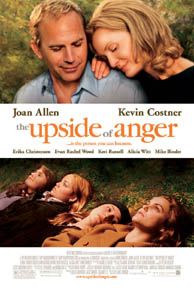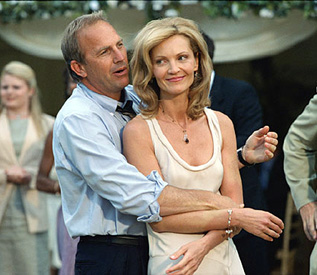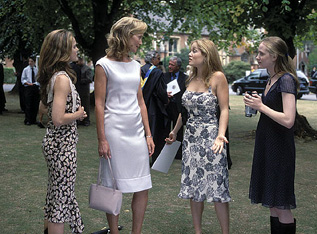
We don’t usually get to see Joan Allen in a starring role. There’s only really been The Contender. Otherwise it’s been supporting roles in films like The Notebook, The Bourne Supremacy and Face/Off. Even big roles in Pleasantville and The Ice Storm cast her as an equal part in a big ensemble.
The Upside of Anger has a large cast, but Allen is clearly the star. She’s the bitter, middle aged sudden divorcee who spends the whole movie berating other behind and in front of their backs. She’s got a tumultuous romance with Kevin Costner, strained ties with her four daughters and a knock down drag out with Shep (played by writer/director Mike Binder) over his dating her teenage daughter.
Joan Allen is a delight to interview, a skilled thespian with plenty to say about her craft. She’s got a sense of humor about the occasional offbeat question, but it doesn’t break her stride. She also looks great gardening naked in Off the Map, a little indie film opening this weekend too if you get a chance to see that.
Q: Was this role written specifically for you?
Joan: Mike wrote it for me and so I was glad I opened my mouth a few years before that during The Contender and said, “Would you keep me in mind any time you do a comedy?” And he did and he wrote it for me. So, knock on wood about that, but I was really thrilled.
Q: Did you buy into that rhetoric about older women being bitter?
Joan: Well, that’s what I think is cool, because in some ways, he’s got a point. I mean, who wants to go out with Terry Anne Wolfmeyer. She’s not very fun. On the other hand, she’s got a point. It’s disgusting that you’re dating someone who is underage. Hello. That’s what I think is cool, is it sort of puts it out there and then you can kind of go, “Hmm, yeah, I mean, who would? I don’t think she’d be very fun to go out to dinner with.” But on the other hand, “Don’t sleep with a 16-year-old!” So I just like that he’s kind of throwing it out there very much.
Q: Did you want people falling over laughing at your comments?
Joan: Oh, people when I saw it in Sundance were falling out laughing. Falling out laughing.
Q: What about cringing?
Joan: Well, she’s tough. And I like that too about the character. I think Mike talked about and I thought about how society has a very hard time dealing with women’s anger period. And I think it gets pushed to the side, I think they don’t want to look at it, I think if a woman is angry she’s labeled immediately. And there’s a different standard for men and anger and women and anger. So not that this is such a huge thematic message film, because I think a lot of it is really cool entertainment, I think there is something out there like yeah, you know. She’s been incredibly hurt and that’s where a lot of anger I think comes from in general is somebody gets their feelings really, really hurt and enzymes or whatever start charging in and then you protect yourself. And one way of protecting yourself is to get really pissed off.
Q: Could this character outdrink Nicolas Cage in Leaving Las Vegas?
Joan: I think they’d really have — I think they might really be able to go toe to toe.
Q: What is your drink of choice?
Joan: My drink of choice is a little bit of white wine. And it’s funny, I couldn’t drink at all during the shooting. It was too grueling. I was working every day. We were working like 14 hour days and I was like my god, all you’ve got to do is go to work, do my thing and then I’d come home, look at my lines and collapse. It was almost like being an athlete to do this particular role. I kind of went into like training.
Q: Was it weird Shooting Americana in
Joan: I know, you kind of just sort of go well, whatever. We’re driving on the opposite side of the road to go to work. Okay. At first, when my agent first said, because I had shot the Sally Potter film which is coming out I think in June in the spring in
 Q: Talk about the mother and daughter dynamic.
Q: Talk about the mother and daughter dynamic.
Joan: It was fun. All the actresses playing my daughters are just phenomenal. I mean, great people, wonderfully professional. They had so much experience. They’ve taken acting classes and singing and this and that. Talented, talented girls and we had a really great time. And they had a lot to put up with with a mother who’s not really looking after them very much, you know, at that particular time. They kind of have to fend for themselves in this particular moment in their family’s history.
Q: How did you turn that off between takes?
Joan: You just kind of turn it off. It’s kind of like that’s that. Pretend like okay, now I’m pretending that she’s really dark and angry.
Q: You’re able to do that?
Joan: Pretty much. Oh yeah. I mean, there are certain days when certain scenes, I can’t go in and out. It’s very emotional, really big sobbing or something. That day, I have to sort of go like this and remember what I have to do and I can’t in between takes just go, “Hey, how you doing?” But it really depends on the scene, but at night, I kind of go, “Okay, let’s see what’s going on…”
Q: Talk about your dynamic with Kevin. Had you worked together before?
Joan: I hadn’t worked with him. It’s one of those things. Sometimes it works, sometimes… I just thought the chemistry was really, really great. It was very relaxed and low key and we tried different things. And he was very game and I thought it was age appropriate relationship which was very nice. I thought that was really good and I think he and Mike had a very good dynamic.
Q: He’s a supporting character to your lead. Did you feel that off screen too?
Joan: I don’t think of stuff that way. I come from such an ensemble background. I worked in the Steppenwolf theater. It’s an ensemble and so yeah, one time you’re doing the lead. The next time you’re doing the this, you know. But I know Kevin’s history obviously. He has a lot more, usually, to say. I mean, he writes sometimes and he produces and he directs and he writes and so he really loved Mike I think and loved the project. And I think it was a really good part for him.
Q: How was dancing with him?
Joan: Oh, it was fun. I wish there was more of it. We got to actually dance more. I wish they kept that on screen a little bit longer.
Q: Being a director, how did he take direction?
Joan: You know, he always had ideas I think about what he wanted and how he wanted to maybe try the scene, but Mike was able to talk to him and say, “Well, think about this and think about this is what’s going on.” They had a really good dialogue going on.
Q: Did you see a little Shirley and Jack/Terms of Endearment?
Joan: A little bit. I did se that. That’s the closest thing that I could kind of sea.
Q: Who is easier to empathize with, this character or the one from The Notebook?
Joan: I empathized with both of them. I don’t know if I could calibrate it, one or the other. Maybe a little bit more with Terry in Upside. But usually, like people that behave that way usually have been hurt and as an actor, I usually look at what makes this person be this way. What happened in their life? So that’s always something that I try and keep in mind.
Q: Did you have a backstory on the marriage?
Joan: No. In fact, that was one of the reasons which I loved that the character finds Kevin resistible for a long time because he’s such a heartthrob in the public eye that she really is just like, “You know, you should leave now.” And I love that, because the backstory that we set up was really that she loves her husband and they probably had barbecues and dinner parties and there were probably drinks on the table every night and Kevin probably came over as a friend and hung out, but she really loved him. And so his just disappearing was really, for a younger woman, was really very [traumatic.]
Q: Are there any cut scenes dealing with his affair?
Joan: No. That wasn’t stated that way but there was a whole sequence which I think is on the DVD which Mike lifted out of the film. And it was dream sequences of Terry asleep at night dreaming about her husband being with Inga or whatever her name is. And the pain of visualizing them in different sexual positions and all that stuff. And he felt that they ultimately didn’t work in the film. They were very fun to shoot because there was one where I basically bludgeoned him to death. And it was really shot like a B horror film. I catch him in bed with this woman. I go, “That’s it. That’s it. I’m getting’ the axe.” Then I drag the dead bodies out and they were all wrapped in gauze and covered in blood and all this stuff. But Mike didn’t feel when he was putting it together that it really was worthy.
Q: Do you make a conscious choice to be different in each take?
 Joan: It’s a combination but usually there’s a certain amount of consciousness going into it, especially with this character and the degrees of intoxication. I just tried to stay open and willing to make an ass out of myself if I had to because I would come in- – usually in the morning I would come to Mike and one of the first questions I would say is, “Okay, where are we on the scale here? Toasted, plotzed…” And we would start and he would say, “Well, let’s try it where she’s really having a hard time.” And so then we would do that and then he would say, “Okay, now, let’s pull back a little bit.” So we just tried to be playful about the whole thing. So then, also, while the scene’s happening, you hope that you’re staying open within certain parameters to inspiration.
Joan: It’s a combination but usually there’s a certain amount of consciousness going into it, especially with this character and the degrees of intoxication. I just tried to stay open and willing to make an ass out of myself if I had to because I would come in- – usually in the morning I would come to Mike and one of the first questions I would say is, “Okay, where are we on the scale here? Toasted, plotzed…” And we would start and he would say, “Well, let’s try it where she’s really having a hard time.” And so then we would do that and then he would say, “Okay, now, let’s pull back a little bit.” So we just tried to be playful about the whole thing. So then, also, while the scene’s happening, you hope that you’re staying open within certain parameters to inspiration.
Q: What’s more difficult, a real person or fictional character?
Joan: Well, this one was pretty scary to me because of the comedy and not having really done it in such a big way on screen before. I was so glad we had rehearsal because I really needed that time to go through the material several times and just take stabs at it, you know, of this feels too big, this doesn’t feel right. So Pat Nixon was at least more enigmatic. Nobody really knew what was going on with her.
Q: How scary was it to garden in the nude in Off the Map?
Joan: That was really scary because I was on the fence about until like a week or two before. [Director] Campbell [Scott] was ready with a body double and I was like, “I don’t know if I can do this.” And then I finally decided that I should do it because I felt like I wouldn’t understand the character unless I went completely there. And I don’t know, there’s something about the air in New Mexico like why would you wear your clothes when you garden?
Q: Did you understand the character more?
Joan: It did help me. I mean, you meet people there that their babies are born in hot tubs and stuff like that. It’s really cool alternative people that are old hippies and environmentalists and all this stuff. I talked with people who lived in the area.
Q: Who is your character?
Joan: Oh, she’s a great character. It’s a family that lives off the grid and Sam Elliot plays my husband and he’s going through a depression. And the family lives on $5000 a year, we have a daughter that’s 13 years old played by a wonderful, young actress. And it’s how the family deals with the family falling apart basically and Sam was amazing in it because he would just have scenes, he’d just come and cry every day. Which I thought was so cool for him because everybody knows him as like the silent, strong guy. So you have that coming in when you see him and then when you see him weeping at the dinner table and how the family copes with it. It’s sort of like Terrence Malick films. The landscape plays a huge part in it and it’s how the family copes and it just unfolds in a very gentle, kind of accumulated way that’s really beautiful. I’m really proud of it.
Q: Is there anything you haven’t played that you’re dying to?
Joan: I don’t know. There are people that I’d like to work with. There are a lot of people I’d like to work with. And this, the past couple years, between Off the Map, this one and the Sally Potter film that’s coming out, I’ve basically gotten to do earthy and grounded and I’ve gotten to do drunk and suburban and funny. And the Sally Potter film is a very sensual, it’s the most sensual performance I’ve ever done. No skin. No nudity whatsoever. As of the moment, I think it comes out June 24th.